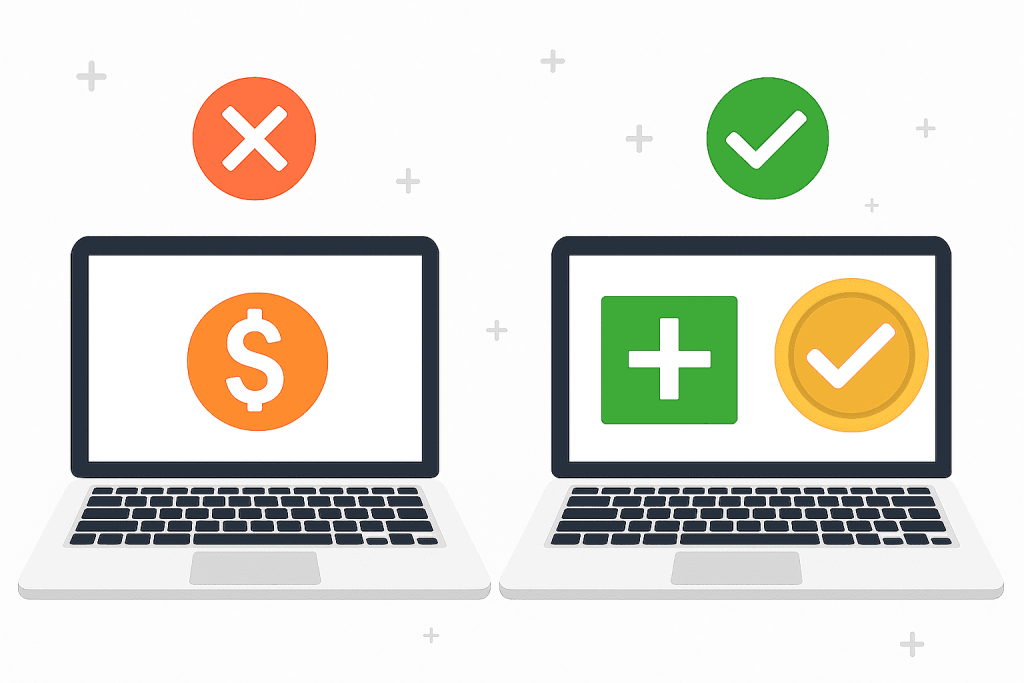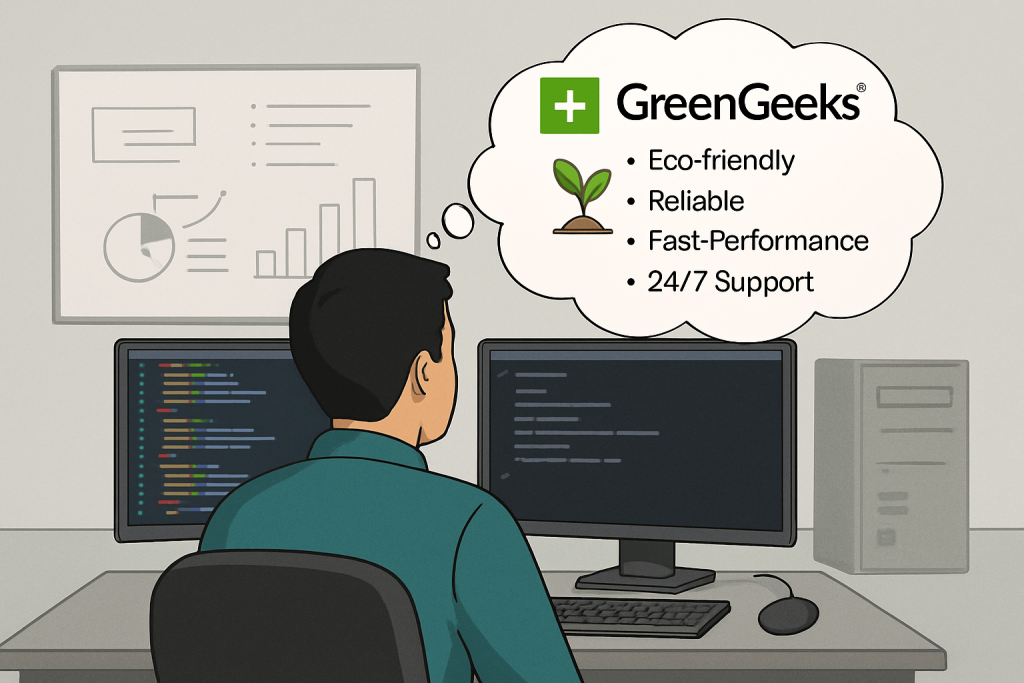When selecting a web hosting provider, price alone rarely tells the complete story. The actual value comes from examining what features you receive, how much those features cost over time, and how well the service performs when you need it. GreenGeeks has positioned itself as a strong alternative to GoDaddy by focusing on specific areas where hosting customers often encounter frustration: unexpected renewal costs, limited storage, and missing features that require additional purchases.
The Cost Structure Comparison
GoDaddy operates with a pricing model that many hosting customers find problematic after their first billing cycle. The company advertises low introductory rates that increase substantially upon renewal. These renewal rates can double or triple the original price, and this pattern repeats across most of their hosting plans. GreenGeeks takes a different approach by maintaining more consistent pricing between initial terms and renewals.
The difference becomes clearer when examining what each plan includes. GoDaddy’s basic shared hosting plans come with storage caps, typically ranging from 25GB to 100GB, depending on the tier. Once you exceed these limits, you need to upgrade to a more expensive plan or purchase additional storage. GreenGeeks provides unlimited SSD storage on all shared hosting plans, eliminating the need to monitor disk usage or worry about hitting capacity limits as your site grows.
Domain registration presents another cost consideration. GoDaddy includes a free domain for the first year, after which standard renewal fees apply, typically around $17 to $20 annually. GreenGeeks covers domain registration costs for as long as you maintain your hosting account. Over five years, this saves approximately $80 to $100, and the savings continue to accumulate the longer you host with them.
Feature Availability and Included Services
The distinction between what comes standard and what costs extra shapes the total expense of hosting. GreenGeeks includes automated nightly backups with one free restoration per month on every plan. GoDaddy’s backup services vary by plan level, with basic shared hosting often requiring a separate backup add-on purchase that costs $2 to $5 monthly. For a website owner who values data protection, this adds $24 to $60 annually to GoDaddy’s hosting costs.
SSL certificates follow a similar pattern. Both providers offer free SSL for the first year, but GoDaddy charges for renewals on most plans, typically $79.99 per year. GreenGeeks maintains free SSL certificates throughout your hosting term. Website staging environments, which allow you to test changes before making them live, come standard with GreenGeeks accounts. GoDaddy reserves staging capabilities for higher-tier plans or specific WordPress hosting packages.
Content delivery networks help websites load faster for visitors in different geographic locations. GreenGeeks includes CDN access across all plans, while GoDaddy primarily bundles CDN services with their managed WordPress hosting, not their standard shared hosting offerings. The performance benefit of a CDN becomes particularly noticeable for sites with international traffic or image-heavy content.
Marketing and SEO tools represent another area where included features differ. GreenGeeks packages include basic SEO and marketing optimization tools without additional charges. GoDaddy treats these as premium add-ons, with their SEO tools starting at $6.99 monthly and email marketing services priced separately.
Environmental Impact and Energy Usage
GreenGeeks purchases wind energy credits equal to three times the energy their services consume. This means every website hosted with them effectively contributes more renewable energy to the grid than it uses. The company provides EPA Green Power Partner certification to customers who want to display their environmental commitment. GoDaddy does not currently offer comparable renewable energy programs or certifications for its standard hosting services.
This environmental approach extends beyond marketing claims. GreenGeeks’ data centers use energy-efficient hardware and cooling systems, and the company maintains partnerships with recognized environmental organizations. For businesses that track their carbon footprint or have sustainability requirements, hosting represents a measurable component of their environmental impact.
Performance Metrics and Server Infrastructure
Independent monitoring services track uptime and response times across hosting providers. Recent six-month monitoring periods show GreenGeeks maintaining uptime close to 100 percent, while GoDaddy users report periodic outages that bring their actual availability below the advertised 99.9 percent guarantee. Both companies offer uptime service level agreements, but actual performance data suggests GreenGeeks delivers more consistent availability.
Page loading speed affects both user satisfaction and search engine rankings. Side-by-side tests conducted in 2025 show GreenGeeks achieving faster average load times, particularly for sites serving European and Canadian audiences. GreenGeeks operates data centers in the United States, Canada, and the Netherlands, providing good coverage for North American and European traffic. GoDaddy maintains a broader global server network, but recent speed tests indicate slower performance in some regions, particularly Asia.
The technical specifications of hosting infrastructure influence these performance differences. GreenGeeks uses SSD storage exclusively, which provides faster data access than traditional hard drives. They also implement LiteSpeed web servers with built-in caching, HTTP/2 support, and MariaDB databases. GoDaddy uses a mix of storage types depending on the plan level, with SSDs limited to certain packages.
Customer Support Quality and Response Times
Support quality measurements come from aggregate user reviews and expert panel assessments conducted throughout 2025. GreenGeeks maintains an average satisfaction score of 4.5 out of 5, while GoDaddy scores 3.2 out of 5. These ratings reflect multiple factors, including response time, problem resolution rate, and support staff knowledge.
Live chat response times show measurable differences between the providers. GreenGeeks typically connects customers with support agents within two to three minutes, and most issues resolve during the initial interaction. GoDaddy’s chat support often involves longer wait times and more frequent transfers between departments. Email ticket responses follow similar patterns, with GreenGeeks averaging faster initial responses and fewer back-and-forth exchanges to resolve problems.
The technical expertise of support staff affects problem resolution efficiency. GreenGeeks employs specialized hosting technicians who handle a narrower range of services, allowing deeper knowledge of their specific platforms. GoDaddy’s support covers a vast array of services beyond hosting, which can result in less specialized assistance for hosting-specific issues. Customer feedback frequently mentions GreenGeeks’ support staff providing more detailed technical explanations and custom solutions compared to GoDaddy’s more scripted responses.
Migration Services and Switching Costs
Moving an existing website from one host to another involves technical steps that can intimidate non-technical users. GreenGeeks provides free website migration assistance, with their technical team handling the transfer process. This service covers one website per account and includes moving files, databases, and email accounts. GoDaddy charges for migration services, with prices varying based on site complexity and the number of sites being moved.
The migration process with GreenGeeks typically completes within 24 to 48 hours, depending on site size and complexity. Their team coordinates the transfer to minimize downtime and ensures the site functions properly on the new servers before completing the domain pointing changes. This hands-off approach removes technical barriers that might otherwise prevent users from switching providers.
Storage, Bandwidth, and Resource Allocation
Resource limits affect how much content you can host and how many visitors your site can serve. GreenGeeks provides unlimited storage and bandwidth on all shared hosting plans, though fair use policies apply to prevent abuse. GoDaddy implements specific storage caps on entry-level plans, starting at 25GB for their Economy plan and scaling up with higher tiers. Bandwidth limitations also apply to GoDaddy’s basic plans, with unmetered bandwidth reserved for higher-cost options.
Email account creation shows another resource difference. GreenGeeks allows unlimited email addresses on your domain, while GoDaddy restricts email accounts based on plan level, starting with 10 free email addresses for six months on their basic plan, then transitioning to paid email services. For businesses that need multiple employee email addresses, this represents an ongoing additional expense with GoDaddy.
Database limits affect sites running content management systems or custom applications. GreenGeeks permits unlimited MySQL databases across all plans. GoDaddy restricts database numbers on lower-tier plans, with 10 databases on their Economy plan and 25 on their Deluxe plan. Sites running multiple WordPress installations or other database-dependent applications may hit these limits quickly.
Developer Tools and Technical Features
Technical users and developers require specific tools and access levels to build and maintain websites effectively. GreenGeeks includes Git integration, SSH access, and multiple PHP versions on all plans. These features allow developers to use modern workflows and maintain version control for their code. GoDaddy restricts SSH access and advanced developer tools to higher-tier plans or specific hosting types.
Staging environments let developers test changes before applying them to live sites. GreenGeeks provides staging capabilities as a standard feature, allowing you to create test copies of your site, make modifications, and push changes to production when ready. GoDaddy’s staging features appear primarily in their managed WordPress plans, not their standard shared hosting.
The ability to choose PHP versions matters for compatibility with different applications and frameworks. GreenGeeks supports multiple PHP versions simultaneously and allows easy switching through their control panel. Users can run older applications requiring PHP 7.x while testing newer code on PHP 8.x. GoDaddy’s PHP version management varies by plan type, with less flexibility on basic shared hosting.
Security Features and Protection Levels
Website security involves multiple layers of protection against various threats. GreenGeeks includes real-time security scanning, automatic malware removal, and custom security rules without additional charges. Their security infrastructure uses ModSecurity rules, account isolation, and proactive monitoring to prevent and address threats. GoDaddy offers basic security features on all plans but charges extra for advanced protection like malware scanning and removal.
SSL certificates encrypt data transmitted between websites and visitors. While both providers offer free SSL initially, GreenGeeks continues to provide free certificates throughout your hosting term. GoDaddy charges for SSL renewal after the first year, adding approximately $80 annually to hosting costs. The automatic SSL installation and renewal process with GreenGeeks removes manual certificate management tasks.
Backup frequency and retention policies determine how much data you can recover after problems occur. GreenGeeks performs nightly backups automatically and retains them for several days, with one free restoration monthly. Additional restorations cost a nominal fee. GoDaddy’s backup policies vary significantly by plan level, with basic shared hosting often lacking automated backups entirely unless purchased as an add-on service.
Long-term Value Analysis
Calculating the true cost of hosting requires looking beyond monthly fees to include all necessary features and services over time. A five-year comparison demonstrates how costs accumulate differently between providers. Starting with basic shared hosting suitable for small business websites, GoDaddy’s initial promotional rate might seem attractive. However, adding necessary features like backups ($3 monthly), SSL certificates after year one ($80 annually), and email services after the trial period ($5 monthly per mailbox) increases the total substantially.
GreenGeeks includes these features in their base price, making long-term budgeting more predictable. The lifetime free domain registration alone saves $85 to $100 over five years. Free SSL certificates save $320 over the same period. Included backup services save $180. When these savings combine with more stable renewal pricing, GreenGeeks often costs less than GoDaddy despite potentially higher initial rates.
The value calculation extends beyond pure dollar amounts. Time spent dealing with billing issues, researching add-on services, or managing feature limitations represents hidden costs. GreenGeeks’ inclusive approach reduces administrative overhead and eliminates surprise charges that complicate expense tracking.
Market Position and User Demographics
Understanding which users benefit most from each provider helps clarify the value proposition. GreenGeeks serves small to medium businesses, bloggers, developers, and environmentally conscious organizations particularly well. Their feature set and support structure cater to users who want comprehensive hosting without managing multiple add-on services.
GoDaddy’s massive scale and service variety appeal to users who need domain registration, email, marketing tools, and other business services from a single provider. Large enterprises with dedicated IT staff might find GoDaddy’s enterprise solutions more suitable. However, for standard web hosting needs, the additional services often come with complexity and costs that smaller users don’t require.
User reviews and industry rankings consistently place GreenGeeks ahead of GoDaddy for value, support quality, and included features. Professional reviewers note GreenGeeks’ transparency and straightforward pricing as key advantages. GoDaddy receives recognition for market presence and service variety but lower marks for customer satisfaction and value proposition in the hosting category specifically.
Making the Decision
The choice between GreenGeeks and GoDaddy depends on specific needs and priorities. GreenGeeks provides better value for users who want predictable costs, comprehensive included features, and strong environmental credentials. The combination of unlimited storage, lifetime domain registration, included backups, and superior support creates a compelling package for most hosting needs.
GoDaddy might suit users already invested in their ecosystem or requiring specific enterprise features. However, for pure web hosting value, GreenGeeks delivers more features at a lower total cost over time. The performance advantages, particularly for North American and European audiences, combined with better support experiences, make GreenGeeks the stronger choice for most website owners.
The data shows GreenGeeks exceeding GoDaddy in areas that directly affect hosting quality and total cost. From renewable energy leadership to transparent pricing and included features, GreenGeeks addresses common hosting pain points more effectively. For users evaluating alternatives to GoDaddy, GreenGeeks presents a proven option with measurable advantages in performance, support, and long-term value.





